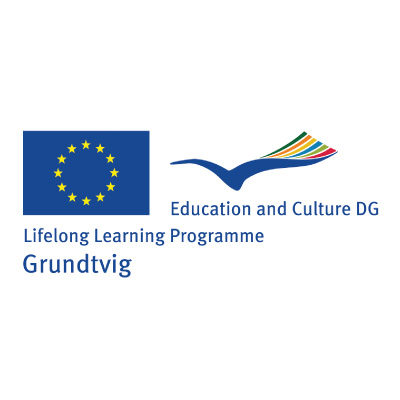KODE - Learning Languages: the Keys to Open the Door to Europe
Promimpresa is a partner of the project “KODE – Learning Languages: the Keys to Open the Door to Europe” (2011-1-ES1-GRU06-35049-7), funded in the framework of the Grundtvig Partnerships of the LLP – Lifelong Learning Programme of the European Community.

LLP GRUNDTVIG PROGRAMME
The LLP is the Community’s action programme in the field of lifelong learning, the aim of which is to promote exchanges, cooperation and mobility between education and training systems within the Community, so that they become a world quality reference.
The LLP structure is made up of four sectoral programmes or sub-programmes: Comenius, Erasmus, Grundtvig and Leonardo da Vinci. Among these, Grundtvig is the one that responds to the teaching and learning needs of people involved in all forms of adult education, as well as the institutions and organisations that are responsible for or facilitate this type of education.
For Promimpresa, which has always been attentive to opportunities for development and openness to new contexts and perspectives, participation in Grundtvig projects represents an opportunity for growth and comparison.
THE PARTNERSHIP
The KODE project was designed and implemented by 7 institutions: EOI Ronda – Ronda (Spain); Kingston Adult Education – London (United Kingdom); Ädelfors folkhögskola – Jönköping (Sweden); Bildungswerk für Friedensarbeit (BF) – Bonn (Germany); English Services – Krosno (Poland); Promimpresa – San Cataldo (Italy); Çiftlik İlçe Milli Eğitim Müdürlüğü – Niğde (Turkey).
PURPOSE AND AIM
The final aim that guided the partners was to spread the learning of European languages in order to allow adult learners to open the doors of Europe: to communicate, to share, to make experiences and to know other cultures, to find common roots and to make Europe grow.
In concrete terms, the project foresaw, during the ordinary course of the foreign language courses at each of the schools involved, the deepening of the themes defined as topics of the project. The language learners of the seven partners reflected, discussed and produced some papers on these topics:
– immigration/integration
– respect for and protection of the environment
– gender equality.
The issues related to these topics were dealt with and addressed in various forms: written essays, plays, videos, comics, power-point presentations, etc… The works produced were shared on MOODLE, an e-learning platform used by all project participants (coordinators, teachers and pupils). Some of these works were also presented by the authors during meetings held in the institutions of the partnership.
PROJECT MEETINGS
For the implementation of the project, a number of meetings were planned to plan and check the progress of the activities. There were seven meetings in total, one hosted by each of the project partners.
The first and last meetings were attended only by staff members of each partner, as they were aimed at planning and verifying the results achieved. The other meetings were mainly dedicated to the work done by the pupils and to their involvement in training and socialisation activities.
- the staff work session, during which coordinators and teachers monitored the progress of the project, checked the results achieved so far and planned future activities;
- the pupils’ work session, with classroom activities, socialisation language games and the public presentation of their work on the topics;
- the institutional meeting of the whole group of participants with the local authorities (the mayor of the city or his delegate);
- some visits to nearby places or sites of interest;
- some recreational and social activities (football matches, games, dancing and singing, tasting, etc.).
Participation in the meetings was an exciting and unforgettable experience for everyone involved, thanks to which a community was created that grew larger with each meeting. All the people who gradually became involved in the project in various ways (coordinators, teachers, students, assistants and even family members) stayed in touch with each other after the meetings, so much so that they felt the need to create a dedicated Facebook group. Thanks to this tool, greetings, comments, news, photos, etc. are exchanged. This has created friendships that cross national borders and… build Europe.
THE INVOLVEMENT OF PROMIMPRESA
Promimpresa’s contribution to the implementation of the KODE project has been characterised by commitment and enthusiasm.
In addition to staff members, all staff and pupils from the head office and peripheral offices were involved. The participation and results of the project were disseminated during all training activities carried out at Promimpresa and, in particular, language students were invited to participate in the project and meetings.
A “KODE CORNER” was also set up, a small corner displaying photos and objects brought back from the countries visited during the meetings.
